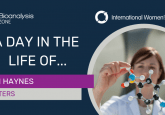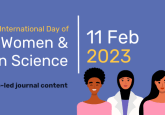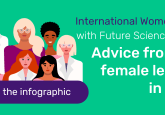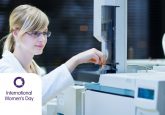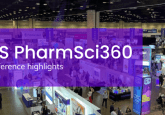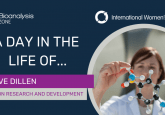Advice to my younger self with Seema Kumar, Louise Rosenmayr-Templeton and Elise Jones

In our third interview in this series, we spoke to Seema Kumar, Louise Rosenmayr-Templeton and Elise Jones to reflect on the proudest moments of their careers, their most effective resources and networks and the advice they wish they’d been given when starting out in STEM. Discover our other interviews and resources from International Women’s Day 2023 here.
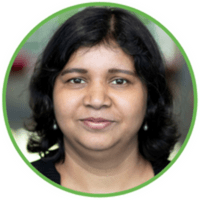 Seema Kumar
Seema Kumar
Director and Senior DMPK Lead
EMD Serono Inc, a business of Merck KGaA (Darmstadt, Germany)
Seema leads the Clinical Bioanalytical Sciences group, EMD Serono Inc, that provides drug disposition support including bioanalysis, immunogenicity and DMPK support for clinical stage NBE programs. Previously, Seema led the Regulated Bioanalytical Group at Pfizer (NY, USA), which provided regulated support for PK, ADA and Nab assays for pre-clinical and clinical programs.
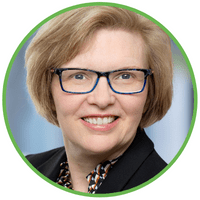 Louise Rosenmayr-Templeton
Louise Rosenmayr-Templeton
Expert/Founder
Tower Pharma Consulting (Berndorf, Austria)
With over 20 years’ of experience in pharmaceutical product development and project management, Louise founded Tower Pharma Consulting in 2002 to provide information and advice to pharmaceutical and biotechnology companies, as well as government agencies. Louise obtained her PhD in the field of novel drug discovery from Nottingham University (UK).
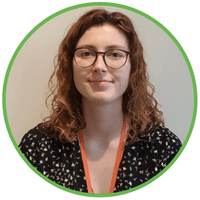 Elise Jones
Elise Jones
Study Director
York Bioanalytical Solutions (YBS; UK)
Elise gained her BSc in Biochemistry from Nottingham Trent University (UK) and worked as a Research Student at MicroPharm Ldt (Cilgerran, UK) during her industrial placement. After working for Unilabs YBS for 4 years in a graduate position, Elise has since progressed to Study Director.
Questions
Seema:
- 1996–99: During my school days, I was fascinated by the complex world where chemistry and biology interact. Hailing from a family where no one before me had pursued a science-driven career, I made my decision purely from the perspective of passion and curiosity and decided to major in chemistry followed by a Masters, specializing in analytical chemistry.
- 1999–2001: Based on my academic performance during my Master’s program, I got a lucky opportunity to do collaborative research at the University of Karlsruhe (Germany), further fueling my research curiosity and motivation.
- 2001–07: I found myself pursuing a PhD at Johns Hopkins University (MD, USA). This was the first time I was able to see my dream of working at the intersection of chemistry and biology coming to fruition.
- 2008–12: I moved into the pharmaceutical industry by joining an early-stage start-up, XBiotech USA Inc. (TX, USA). During my ~5-year stint, I rose from my entry level position as a Lead Scientist to Director of Quality Control and Lab Head.
- 2012–16: I joined Pfizer and led a group of bioanalytical scientists that provided regulated support for Pfizer’s large molecule biotherapeutics portfolio and rose to the position of Senior Principal Scientist.
- 2017–present: I joined EMD Serono as a Senior DMPK lead, overseeing drug disposition strategy to drive molecule design and candidate selection through non-clinical to clinical development. The scope of my role has steadily grown, and I currently serve as Director and Senior DMPK lead for clinical stage programs. I also lead a Clinical Bioanalytical Sciences group, comprising internal full-time equivalents (FTEs) and external consultants.
Louise:
- 1986: Graduated from Strathclyde University (UK) with a BSc in Pharmacy (first class honors) and qualified as a pharmacist a year later following pre-registration training in both a hospital and industry setting.
- Obtained a PhD in the field of novel drug delivery from Nottingham University (UK) under the supervision of Prof. M. Davies and Prof. S.S. Davis.
- Worked in various capacities for major pharmaceutical companies such as Abbott Laboratories (IL, USA), the Élan Corporation (Dublin, Ireland) and Boehringer Ingelheim (Mainz, Germany). Work experience ranged from managing pre-clinical research projects, to the successful scale-up and technology transfer of products to manufacturing sites, clinical trial manufacture and the preparation and review of regulatory documents.
- Set up Tower Pharma Consulting (Berndorf, Austria), a boutique consultancy whose primary focus is on formulation science, product development and drug delivery technologies. Based in Austria, the consultancy provides a variety of scientific, technical and project management services to pharmaceutical and biotech companies.
Elise:
- 18-21: BSc Biochemistry (Hons) at Nottingham Trent University (UK)
- 20: Research Student at MicroPharm Ltd (Cilgerran, UK) for an industrial placement year
- 21-26: Graduate position at Unilabs York Bioanalytical Solutions (YBS) (York, UK)
- 26-present: Study Director at YBS
Seema: I have been lucky to have mentors throughout my career. Finding great mentors requires effort by design as well as a healthy dose of luck. I have found great mentors in expected places such as my organizational leaders but also through chance encounters at conferences and industry focus groups. These relationships have helped me identify my strengths and have significantly helped me in my successful and fulfilling career.
Louise: I don’t think I have ever had a formal mentor, although I have in the past acted as one as part of the Controlled Release Society’s Young Scientist Mentor Protégé Initiative. However, I have learnt from observing bosses, supervisors, colleagues and other people on how to handle specific situations and to work together to overcome issues.
Elise: I’ve been very lucky to find amazing mentors in my career. I did an industrial placement at a small pharmaceutical company in Wales during my BSc in Biochemistry and my supervisor was a woman in science. She really helped build up my confidence when I was just starting out, which fuelled my drive to continue my studies and go into the field with the belief that I could succeed.
I have been working for the same contract research organization (CRO) in York since I graduated and have progressed quickly. I owe this to another woman in science in the Immunoassay/ ligand binding assay (LBA) team for her constant support and encouragement, and the opportunities I have been given to be able to show my abilities and potential. I would like to thank Hayley Jakeman at MicroPharm and Lindsay McMorran (previously at YBS) for being hugely supportive – they really helped my confidence when I needed it most.
Seema: Networking at scientific conferences, Women in Science initiatives, etc.
Louise: I have found going to conferences and getting involved in professional interest organizations as a volunteer, such the International Association for Pharmaceutical Technology (APV, Germany) or the Controlled Release Society (CRS), is a good way to meet a wide variety of people within the industry. I am currently a member of the Drug Delivery Focus Group of the APV and edit its newsletter. For a number of years I was the Chair/Co-chair of CRS committees, such as the Young Scientist Committee, which develops conference programs and initiatives for young scientists.
Elise: I have been fortunate to be surrounded by other women in science, throughout university and at work, who made me feel confident and comfortable. Attending the European Bioanalysis Forum (EBF; Barcelona, Spain) Young Scientist Symposium on two occasions has been particularly rewarding, especially being able to meet other young people at the beginning of their careers in bioanalysis.
Seema: I have always been willing to throw myself into complex, ambiguous problems and taking risky bets on my own ability to learn and deliver. I feel proud and lucky to have mentors and leaders who have supported me while I took those risks and so far, it all seems to have worked out well.
Louise: I think I am most proud of setting up and building my business in a foreign country and learning to speak German fluently at a later stage in life.
Seema: I am excited to see so many women entering our field and I am inspired by an increasingly large number of women leaders at the top. I am doing my best to contribute to this exciting movement by doing my bit to inspire and mentor the next generation of female leaders.
Louise: I am most excited about seeing more diseases that were once considered untreatable becoming either curable or manageable. Personalized medicine, cell, RNA and gene therapy were still only distant dreams when I started out in my career. For example, I would love to see age-related macular degeneration stopped in its tracks and am excited by some of the very novel therapies being developed in this area.
With respect to women in science, I think we need to celebrate that there are many more women actively taking part in scientific research/development and reaching senior positions within academia and industry. Pharmacy has been for many years a female-dominated profession due to the ease with which part-time work can be found in retail. However, when I initially joined the pharmaceutical industry, women occupied significantly fewer scientific/technical roles compared with men and this was even more noticeable at senior levels. Also, in academia, the number of female lecturers was not in line with the predominately female student population.
I think this has changed to a large degree and I can think of several female professors and senior women leaders in industry, although we still have some way to go towards full gender balance.
Seema: The best aspects for me are scientific and strategic thinking and getting inspired by my team of talented scientists. One challenging aspect is that the speed at which we try to innovate is slow and I am hopeful that new trends such as data-driven artificial intelligence or machine learning methods will help accelerate our mission to improve the health of those around us.
Louise: The best part of my job is working with my clients, other consultants and the Contract Development and Manufacturing Organizations (CDMOs) to overcome obstacles and drive the projects forward. I get to work with a lot of people with different types of experience and backgrounds and I am exposed to challenges that I might not encounter if I was an employee. Budgetary constraints and timelines are present in any company; however, for the smaller clients, who are dependent on outside external funding, they take on a different dimension and not achieving certain goals becomes an existential threat. This requires careful team work with the CDMOs to ensure that products developed for the clinic meet the regulatory requirements, while staying on time and on budget.
Elise: I am part of a small team in my company, which can be challenging at busier timestimes, but it is hugely rewarding to be in such a close team of like-minded scientists. It gives us the opportunity to learn each other’s strengths and weaknesses and support each other effectively.
Seema: Work Smart, be patient and be humble. Start with kindness and spend time building a networked community.
Louise:
- Follow your passion and keep going until you achieve your goal. Persistence beats impatience every time.
- Self-knowledge is everything – with it, you can build on your strengths and work out your weaknesses.
- Network, network, network! When I first started out, I didn’t even know how or how important it is.
Elise: You are more capable than you think! It sounds cheesy but I think a lot of women and other minority groups in scientific fields especially struggle with self-confidence and this can cause us to underestimate our abilities. Whenever I have been encouraged or pushed into an opportunity or situation that I didn’t think I was ready for, I trusted the people around me telling me that I could do it and they were always right.
Seema: There are so many thought leaders, colleagues and friends who have inspired me throughout my career, but one person that I would like to give a shout-out to is Jim McNally, Chief Scientific Officer at BioAgilytix (NC, USA). Thank you, Jim!
Louise: My late mother, Martha Templeton, first inspired me to do well at school by regaling me with stories of her own school days and her love of Latin and French. Sadly, ill –health, coupled possibly by a lack of encouragement, thwarted her dream of becoming a lawyer and she left school at fifteen 15 to work in the family business. Fortunately, I had the support of both my parents throughout my education for which I am eternally grateful.

